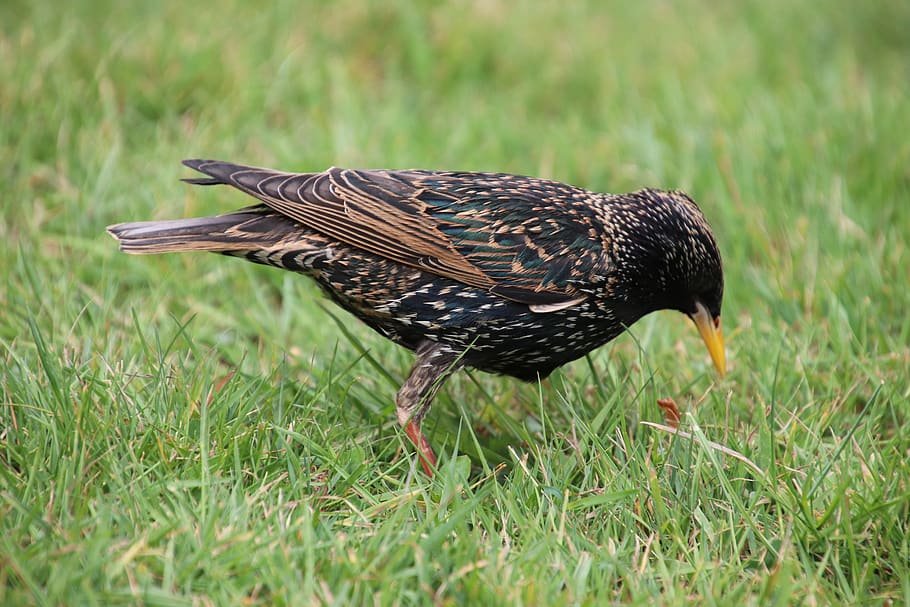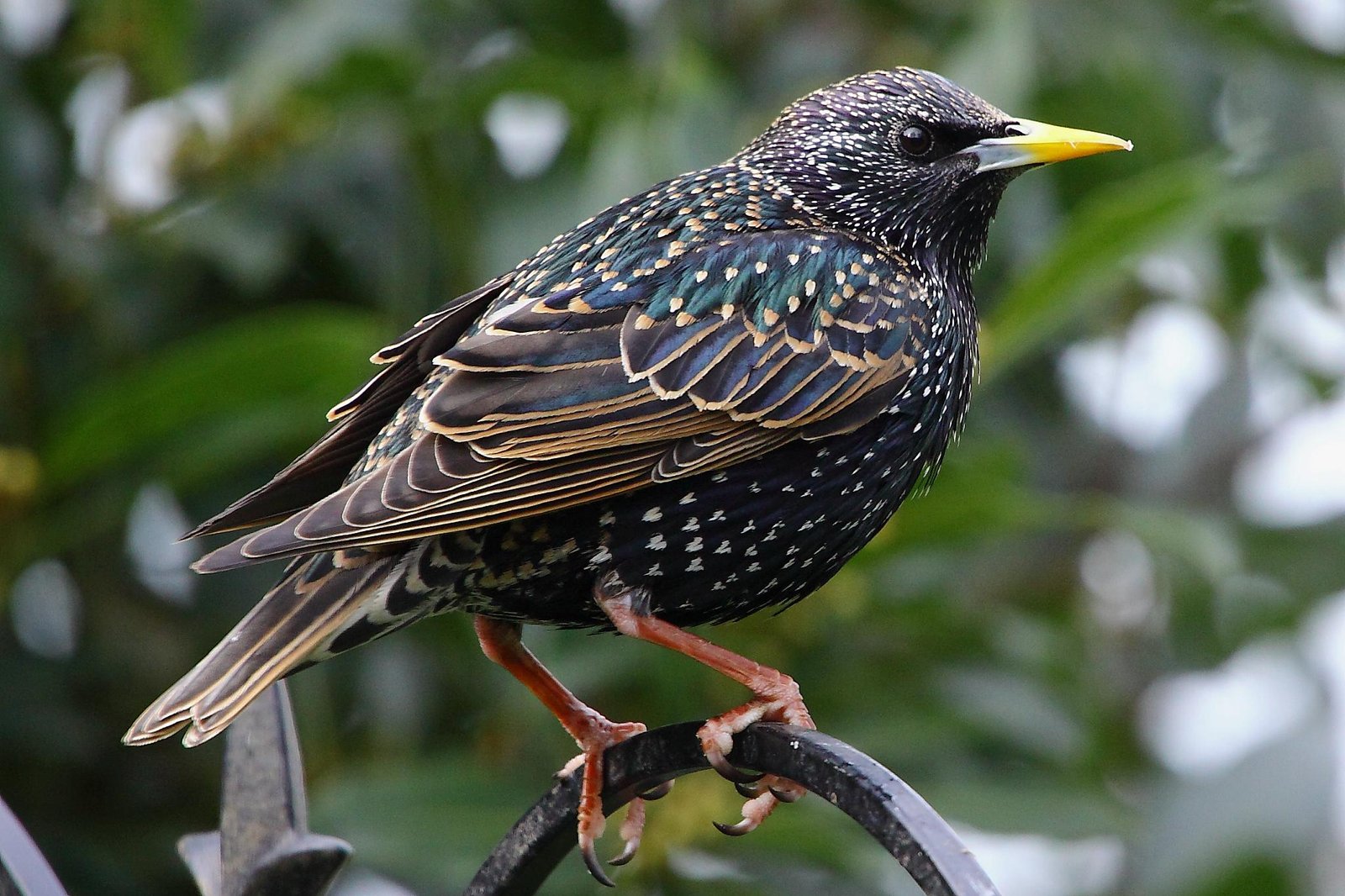Have you ever seen a starling in your home? Though they’re not the least desirable of wildlife visitors, they are quite common. So much so that it’s likely the starling made its way inside your home intentionally.
The oversized songbird is a blackish-purple hue, with speckles of white, yellow and olive. Its wingspan averages up to 10 inches and its head is adorned with a signature iridescent sheen. Though the starling isn’t viewed as a desirable presence in our homes, they have a storied and meaningful history.
The European starling made its way into North America amidst an 18th century plan to populate the United States with every bird mentioned in the works of Shakespeare. Of course, it found its way into our homes and has been a presence in North America ever since. So why does a starling enter your home?
The Need for Warmth
Most likely, a starling flew in”> the opening of your open window or chimney. Despite their hardy reputation, starlings are prone to hypothermia and can often be seen seeking refuge in our warm abodes.
Because starlings are cavity-nesters, your home may also possess similar characteristics that make it feel like a larger version of its nesting box. Sadly, they also sometimes move into small gaps or crevices, seeking shelter from the elements.
Food Sources
Like many creatures, starlings are opportunistic feeders. They seek out easy meals and potential sources of nutrition. Your pantry, kitchen, or garden may provide a pest-free snack or two.
However, you may also have an accommodating neighbor who’s actively seeking to feed and encourage a starling family in the vicinity. A well-intentioned offering of food or water in a nearby yard may cause a flock of eager starlings to look for shelter in your home.
Serenading Intruders
A rather loud sign of a starling is its signature call, which is unmistakeable. The piercing “cleer, cleer” of a starling can be heard from yards away, and sometimes our homes become part of the repertoire for an energetic male trying to attract a mate.
Protecting Your Home
Starlings can cause various amounts of damage to homes, so it’s important to receive a timely eviction order before they make their roost even more permanent. A combination of thoughtful tactics, such as closing off entry points and silencing the intruder, can result in the starling’s peaceful departure.
If all else fails, you may require the assistance of a licensed wildlife removal company. They’re trained to ensure the safety of both the people in your home and the starling itself.
Moving Along
Though their presence can be unwelcome, starlings can be engaging and entertaining visitors. With the right plan of action, you can get rid of a starling and protect your home — or, at the very least, have a temporary neighbor.

How did you ensure that the starling was comfortable and not distressed in your home environment?
The key to our success in providing a comfortable and stress free environment for the starling was implementing a positive reinforcement approach. We began with small, positive interactions geared towards the bird such as providing addition food, nesting material, and lots of attention. We avoided using negative reinforcement techniques in all interactions and instead chose to reward wanted behaviour with verbal praise, head scratches, or treats. We also provided plenty of environmental enrichment with toys that the starling can interact with to stimulate its intelligence and natural curiosity.
Modification of Our Home Environment
In order to provide an optimal environment for the starling, we modified our home to mimic its natural habitat. This included providing a tall, open cage for the bird to exercise its wings. We also included multiple perches of varying heights and shapes on which it could rest and preen, as well as areas of shade for it to take refuge in if it desired privacy. Furthermore, we rearranged our household furniture and ensured that there were no potential hazards for the starling to get tangled in or choke on. To add to the pleasant environment, we also set up calming background music to soothe the bird in times of distress.
Thorough Preparedness
Finally, we prepared a holistic plan for the starling that considered both its physical and psychological needs. We familiarised ourselves with the bird’s diet and nutritional needs and made sure to provide it with a varied supply of fresh fruits, vegetables and nuts. We also monitored its behaviour to ensure that it was not exhibiting any signs of distress, such as excessive preening, pacing, or bobbing. Additionally, we made sure to provide proper medical attention when needed in order to keep the bird in optimal health. All of these considerations ensured that our home environment was comfortable and stress free for the starling.

What inspired the starling to make its way into your home?
Where do starlings come from? It is most likely that the starling came to your home from the wild. Starlings are incredibly adaptable and can become accustomed to living in almost any environment, as they are opportunistic feeders. They will feed on a variety of food sources, such as worms, seeds, fruits, grains, and insects. On average, starlings consume about two-thirds of their own body weight in food per day.
Are Starlings Harmful?
For the most part, starlings are harmless when they make their way into your home. They are more of a nuisance than a danger, accommodating themselves quite well in urban environments. Starlings may create a mess while they are in your home, as they can carry with them a large amount of debris, such as twigs and leaves. While this may not be pleasant, it is not particularly harmful.
How Do I Get Rid of Starlings?
The best way to keep starlings from entering your home is to seal up any potential entry points before they can even get in. Start by examining your home for any cracks or gaps that the starling could squeeze through. Once you have identified any potential entry points, seal them up with mesh, foam, caulk, or a combination of these materials.
You can also keep starlings out of your home by maintaining your yard. Keep the grass trimmed, rake up any leaves or other debris, and keep your trash securely sealed. Starlings are attracted to clutter, so it is important to keep your yard in good condition.
Finally, you can try using scare tactics to encourage the starling to leave your home. Hang up shiny objects that will reflect light, such as old CDs or strings of bells, and place them near any potential entry points. Loud noises and flashes of light may also help to discourage the bird from entering your home.

Introduction
If you have ever worked in banking and financial services, you know the traditional methods of service delivery and operations. These include processes such as manual account opening, paper-based customer onboarding, manual reconciliation, and more. These processes are time-consuming, expensive, and prone to errors.
Digital Transformation
Today, many banks and other financial services organizations are looking to modernize their processes and operations by taking advantage of the latest digital technologies. This digital transformation includes everything from customer service, to operational efficiency, to data analysis and analytics. By leveraging the power of technology, banks and financial services organizations are able to deliver innovative products and services, improve customer experience, and increase operational efficiency.
The Benefits of Digital Transformation
Digital transformation can bring a number of benefits to banks and other financial services organizations. By leveraging modern technologies, banks and other financial services providers can streamline processes, reduce manual labor and costs associated with paper-based operations, and reduce the likelihood of errors. In addition, by leveraging data and analytics, banks and other financial services organizations can gain insights into customer behaviour, enabling them to deliver more personalized services to their customers.
Implementing Digital Transformation Solutions
For banks and other financial services organizations looking to take advantage of digital transformation solutions, there are a variety of solutions available. These solutions can include everything from automated customer onboarding and account opening, to automated fraud detection and prevention, to comprehensive data and analytics tools.
When implementing these solutions, it is important for banks and other financial services organizations to keep security and customer privacy in mind. Solutions should be built with secure technologies and regularly tested for vulnerabilities. In addition, banks and other financial services organizations should ensure that customer data is treated securely and is not shared with third parties without the customer’s consent.
What long-term strategies do you have in place to make sure the starling remains healthy and safe in your home?
The starling will need a warm and safe environment to thrive. Here are a few things that you can do to ensure its health and safety in the long run:
Create a Safe Habitat
Having a live animal come to live in your home is no different than having a pet, there needs to be a safe, secure, and comfortable environment for it. Invest in a tall, roomy birdcage with a solid plastic bottom and a secure latch. Place the cage in a stress-free environment, away from direct drafts, direct sunlight, and other pets. Provide a variety of toys, swings, and perches to keep the starling mentally stimulated.
Provide Balanced Nutrition
Providing your starling with a nutritious diet and fresh water every day is key in keeping the bird healthy and happy. Offer a variety of foods, such as fresh fruits, vegetables, and a variety of bird food. Be sure to limit the bird’s overall consumption of sugar and fatty foods.
Keep the Cage Clean
Not only is a clean cage important for the safety and well-being of your starling, but it also helps to reduce its stress levels. Make sure to clean the cage regularly, as well as the food and water dishes. Have an extra cage on hand for when you need to deep clean the other one.
Allow for Time Outside the Cage
Starlings love to exercise, and it’s important to make sure that it has enough time outside of the cage to do so. Allow for at least an hour of exercise in a safe environment and be sure to secure all windows and doors. If the starling is bonded to you, it’s ultimately up to you to decide when and where it can exercise outside of the cage.
Keep Other Pets Away
It’s important to keep other pets, such as cats and dogs, away from the starling. They can be perceived as predators to the bird and should be kept in separate rooms or areas of the home. If you can’t keep them separated, you can purchase a protective shield or cage net that can be used when the starling is not in its cage.